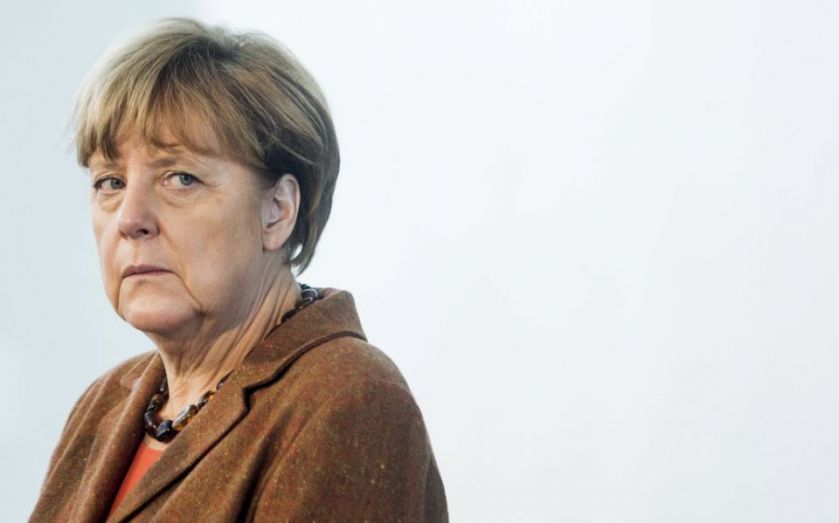Angela Merkel is a symbol of everything wrong with a declining Europe

I have never understood the very odd personality cult that has come to surround Angela Merkel. Uniquely among modern German Chancellors, I cannot think of a single major policy success to associate with her name.
Konrad Adenauer decisively set Germany on a pro-Western path, reconciling with the French. Willy Brandt developed Ostpolitik, seeking to revive ties with the then almost forgotten East of the divided country. Helmut Schmidt (who died at the ripe old age of 96 this month) saw off the hysterical Baader-Meinhof far left, and helped win the Cold War by backing America’s play in putting intermediate range nuclear missiles into Germany. Helmut Kohl, with the underrated support of George HW Bush, unified Germany peacefully. And Merkel? Well, mutti (as the Germans creepily call her) has won a lot of elections against some deeply uncharismatic opponents. We are truly living in the age of Merkel, where longevity and mediocrity have taken the place of historical accomplishment.
In fact, I have little doubt that the present Chancellor’s lasting historical significance will come to be seen as a symbol of what the great eighteenth century historian Edward Gibbon would call decadence: the inability of a society to solve its basic problems; and over time, an abdication of responsibility for them. Be the issue domestic economic reform, the euro crisis, or the present refugee crisis roiling the continent, Merkel is the symbol of Europe’s signal inability to put its own house in order.
In Merkel’s Germany, economic reform is for other people. While she spends large amounts of her time annoyingly lecturing the Greeks, Spanish, and Portuguese that they “must do their homework”, she has lifted nary a finger in terms of domestic economic reforms within Germany itself, while a demographic crisis looms ever more perilously on the horizon.
Merkel’s ruling Christian Democratic Union (CDU) party has moved so far to the left on domestic economic issues that its stance is virtually indistinguishable from the more honest Social Democrats (SPD) and the Greens; tellingly, Germany does not possess a major political party genuinely committed to the free market. Merkel has fiddled while Rome is about to burn. Germany’s workforce will decline by 6m over the next 15 years, even faster than sclerotic Japan’s, as its birth rate has collapsed to the lowest level in the world, threatening its long-term economic viability. And Merkel’s response to this existential challenge? The insane decision to actually lower the retirement age. All remains quiet in Germany; but all also remains unsolved.
And does anyone think the euro crisis is remotely over? While the Chancellor has succeeded in throwing plates in the air – through the three bailouts of Greece, and the one each of Spain, Portugal, and Ireland – the basic currency misalignment of about 20 per cent between the north and the south of Europe has not closed.
Europe is economically becalmed, with still underwhelming growth rates, youth unemployment numbers in the south of the continent that beggar description, and an increasingly resentful southern Europe, which sees Germany as just the latest foreign occupier. All this political bad will might be worth it, if Merkel had managed to put in place a genuine consensus on the continent for real structural economic reform in return for German financial support. But that has not happened, leaving the patient addicted to the next bailout, without ever arising from the economic coma it finds itself in.
If the euro debacle has highlighted an intractable north-south schism in Europe, so the present refugee crisis has made clear that an equally poisonous east-west cleavage is brewing. While I sympathise with the Chancellor’s relatively open-handed instincts over accepting refugees, certainly her doing a little of the policy homework she so often prescribes for others might have been in order. As it is, the eastern Europeans are in near mutiny at having to take in more refugees, with the situation exacerbated by last week’s tragic events in Paris, just as Merkel’s policy seems to involve little more than bribing President Erdogan of Turkey and the African states to police their borders more effectively. Generous Merkel’s refugee policy may be; thought out it isn’t.
So over these three big historical tests of her premiership, Merkel has failed miserably. Despite the recent spate of hagiographies directed toward her, Merkel is a symbol of all that is wrong with a declining, decadent Europe.